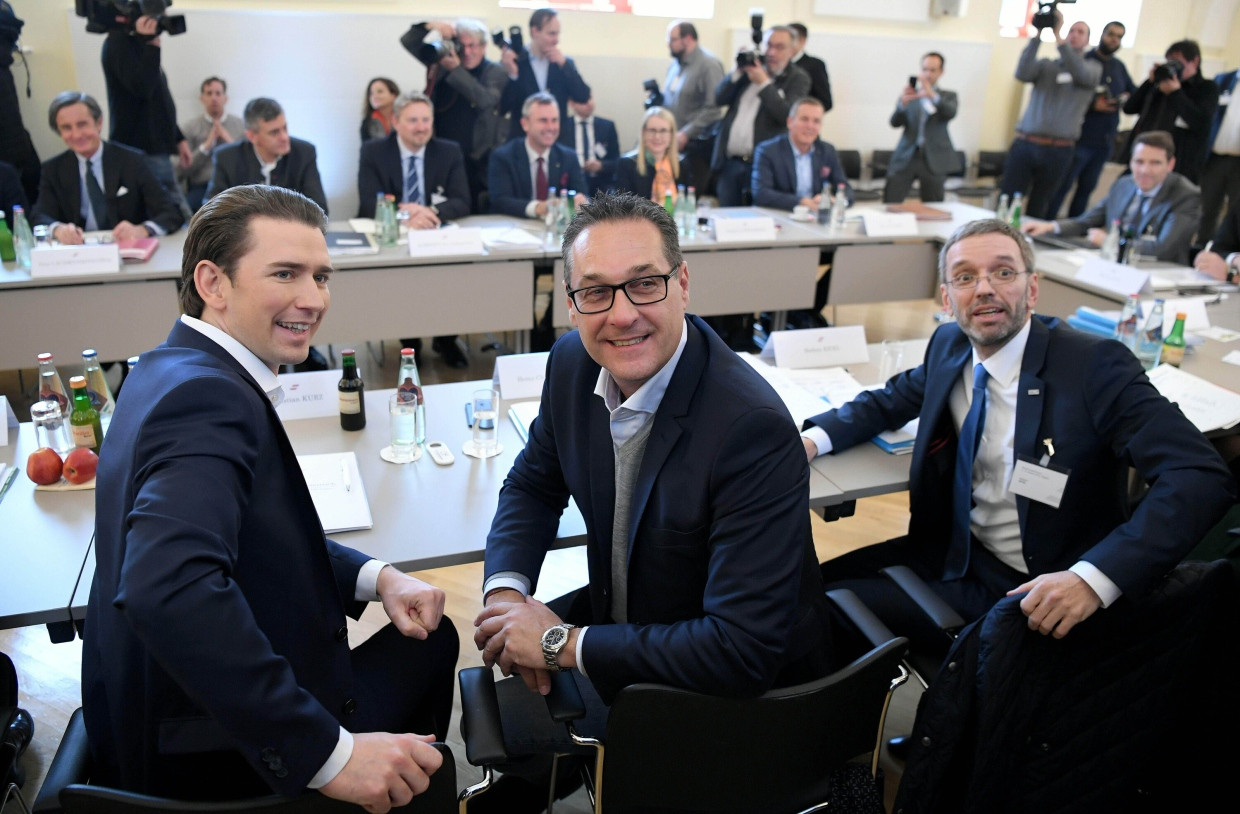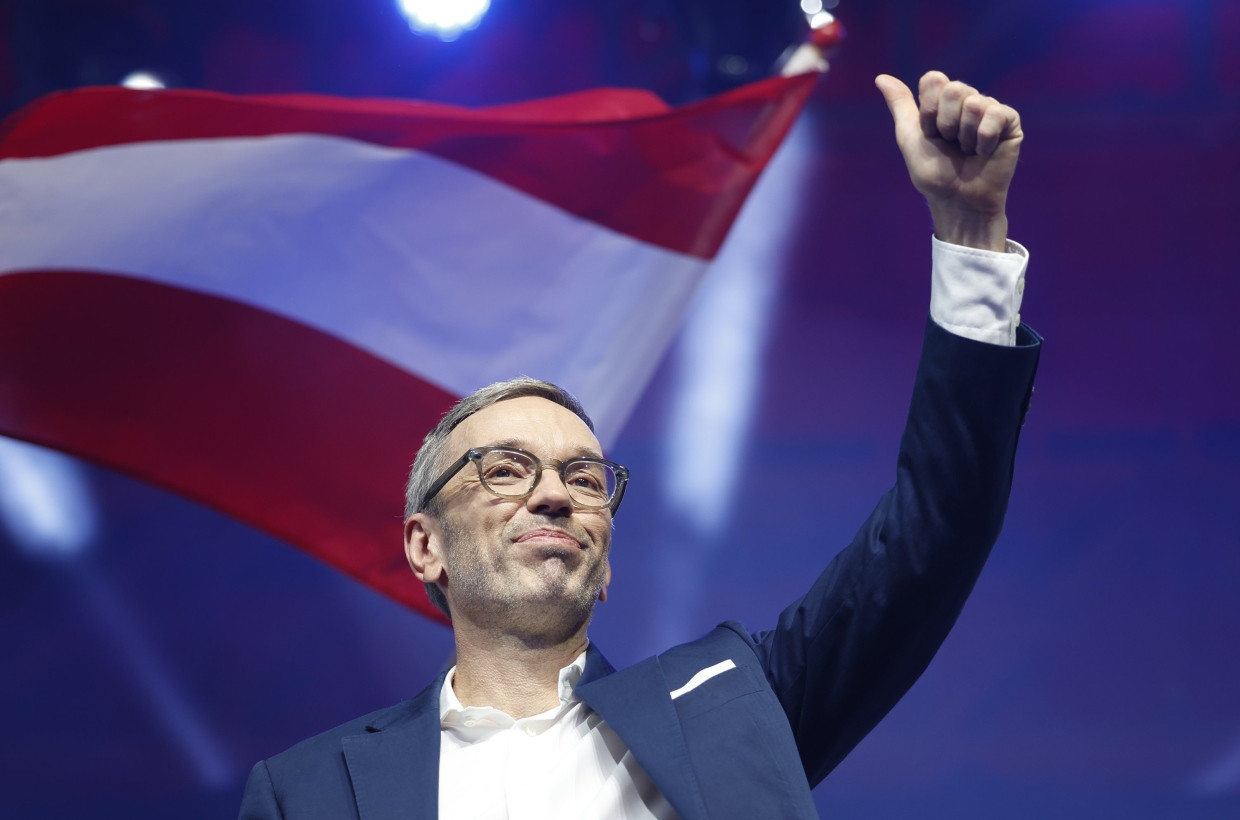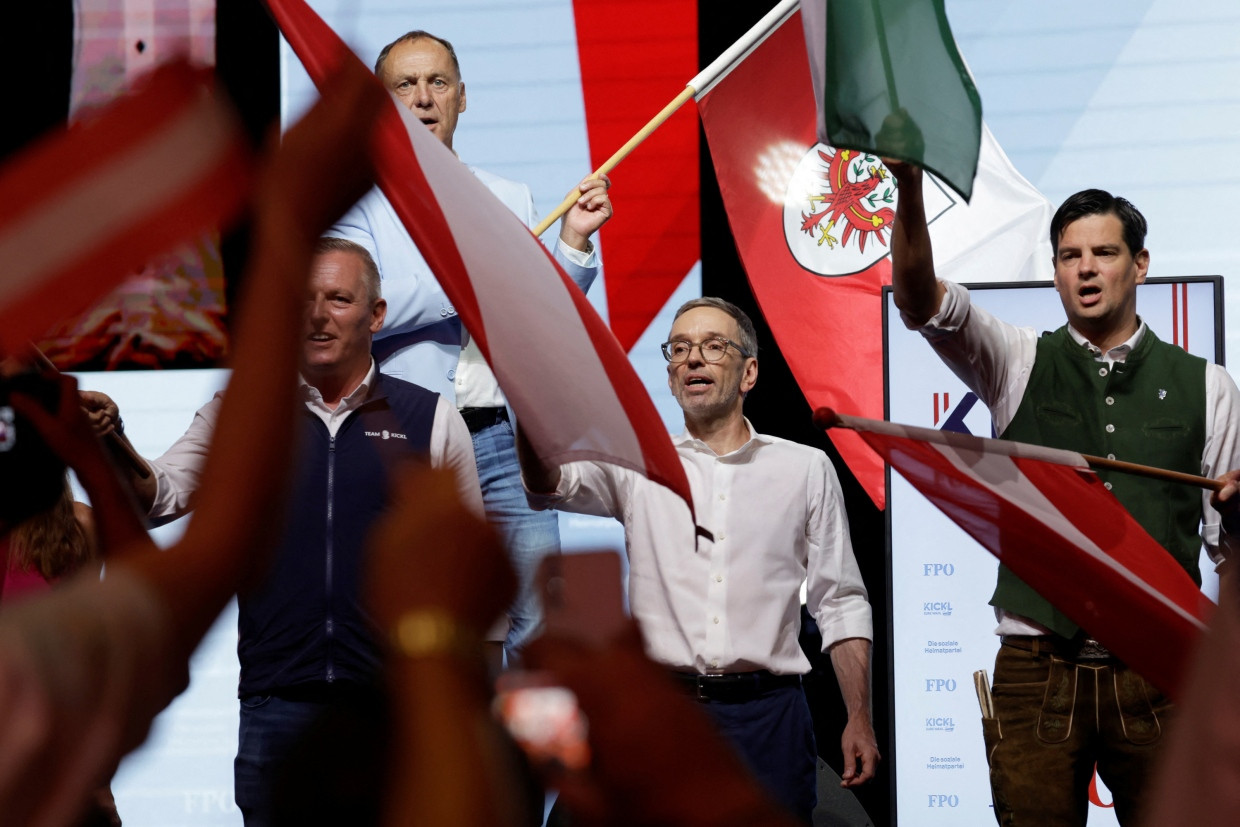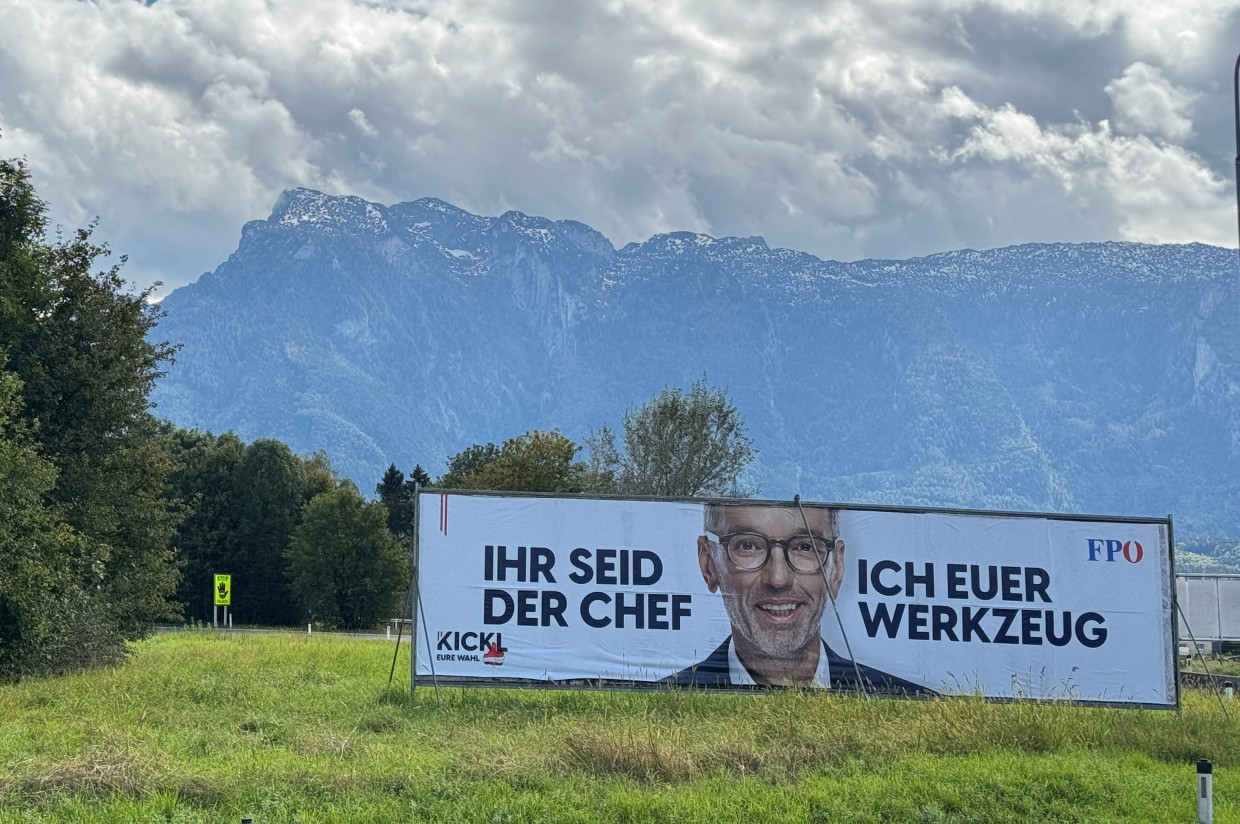Politischer Aschermittwoch der FPÖ. Die Jahnsporthalle der oberösterreichischen Stadt Ried im Innkreis ist packvoll, Hauptredner ist Herbert Kickl. Der Parteichef hat das Publikum angewärmt mit Sottisen über die politische Konkurrenz („Swingerklub“), die „Mainstreammedien“, die deutsche Bundesregierung („Vollkoffer“), die österreichische Kunstszene („ein paar komische Nackerte“). Dann kommt er zu einem ihm ernsten Punkt. „Eine FPÖ, die stark ist, ist das Problem, dann herrscht Alarmstufe Rot am Futtertrog.“ Dort wünsche man sich die FPÖ angepasst und schwach, dann rede man freundlicher über sie. Aber: „Einen solchen abgerichteten Freiheitlichen gibt es nicht.“
An dieser Stelle ereilt Manfred Haimbuchner der Ruf der Natur, er muss mal raus. Haimbuchner ist Vorsitzender der oberösterreichischen FPÖ und gilt in Linz als gemäßigter Freiheitlicher, kompromissfähig und verlässlich. Deshalb ist die christdemokratische ÖVP dort nach Jahren der Koalition mit den Grünen 2021 ein Regierungsbündnis mit Haimbuchners FPÖ eingegangen. Der promovierte Jurist ist Landeshauptmann-Stellvertreter. Als es 2021 um den Parteivorsitz ging, zögerte Haimbuchner lange, ehe er Kickls Zugriff akzeptierte.
Von einer absoluten Mehrheit ist die FPÖ weit entfernt
Sogenannte gemäßigte FPÖler stehen auch weit rechts. Differenzierung à la Haimbuchner sieht etwa so aus: „Remigration, das Wort gefällt mir nicht.“ Rhetorische Pause. Das Reizwort Remigration, das in Deutschland die AfD in Bedrängnis gebracht hat, wird von Kickl gern und offensiv gebraucht. Bekommt er jetzt Kontra aus den eigenen Reihen? Nein, denn Haimbuchner fährt fort: „Besser gefällt mir das Wort der Schweizer: Ausschaffung.“ Die FPÖ werde als Kanzlerpartei das Ziel verfolgen, jeden Einzelnen außer Landes zu schaffen, der seit 2015 illegal nach Österreich gekommen sei und sich illegal aufhalte. „Das ist kein Geheimplan, das ist ein Versprechen.“
Seit Kickl vor drei Jahren den Übergangsvorsitzenden Norbert Hofer durch gezielte Illoyalitäten mürbe gemacht und zum Rückzug gebracht hat, gibt er den Ton an. Vorexerziert hat er das vor allem in Sachen Corona. Die Maßnahmen der „türkis-grünen“ Regierung aus ÖVP und Grünen, die beileibe nicht alle unangreifbar waren, hat er nicht kritisiert, sondern als diktatorisch denunziert. In einem bestimmten wissenschafts- und staatsfernen Teil der Gesellschaft (darunter bisherige rote oder schwarze Stammwähler, aber auch Esoteriker und Naturfreunde) hat er damit Leute zur FPÖ gezogen, denen das sonst nicht im Traum eingefallen wäre.
Und diejenigen Parteifreunde, die sich lieber impfen ließen, als eine schwere Erkrankung zu riskieren, und die Kickls medizinischen Ratschläge zu Entwurmungsmitteln mit Stirnrunzeln hörten? Die überzeugte sein Erfolg. Seit Anfang 2023 ist die FPÖ ununterbrochen an der Spitze der Umfragen. Zuletzt hat sie sich bei knapp 28 Prozent eingependelt. Deutlich dahinter, wenn auch noch knapp innerhalb der Schwankungsbreite, liegt die Kanzlerpartei ÖVP, abgeschlagen auf dem dritten Platz die sozialdemokratische SPÖ. An diesem Sonntag wird gewählt. Dann wird sich zeigen, ob die Umfragen richtig lagen.
Dass Kickl deswegen der nächste österreichische Bundeskanzler wird, oder „Volkskanzler“, wie er es gern nennt, ist nicht gesagt. Im Gegenteil ist die Wahrscheinlichkeit, dass die FPÖ an der nächsten Regierung beteiligt ist, umso geringer, je stärker sie wird. Denn von einer absoluten Mehrheit ist sie weit entfernt. Auch ein Koalitionspartner, der Kickl in das Kanzleramt am Wiener Ballhausplatz bringen würde, ist nicht in Sicht.
Die SPÖ, die liberalen Neos und die Grünen haben eine Zusammenarbeit mit der FPÖ gänzlich ausgeschlossen – und die ÖVP zumindest eine Koalition mit Kickl. Zu seiner Partei haben sich die Christdemokraten hingegen ein Türchen offengelassen. Es gebe dort auch „vernünftige Leute“, sagte Bundeskanzler Karl Nehammer noch am Donnerstag in einem Interview. Über den blauen Parteichef heißt es hingegen in einer Broschüre, die die ÖVP zur Argumentationshilfe an ihre Funktionäre verteilte: „Kickl kann’s nicht“.
„Die roten und schwarzen Polit-Maden“
Als Gründe dafür werden Sprüche Kickls angeführt, von „Fahndungslisten“ für seine Gegner bis hin zur Verharmlosung der Waffen-SS und zu seinem Lob für die rechtsextremen Identitären. Zum Wort „Volkskanzler“ verweist die ÖVP in ihrer Broschüre auf den Duden von 1941, in dem der Begriff so definiert werde: „Bezeichnung für Hitler zum Ausdruck der Verbundenheit zwischen Volk und Führer“.

There are quite a few Kickl sayings that his political opponents get upset about. The Viennese journalist Nina Horaczek filled an entire booklet with it so that everyone could form an opinion about “what a politician like Herbert Kickl at the head of the Republic of Austria … would mean.”
A few samples from the chapter on insults: “We already knew that he was a bit senile” (about the Federal President). “The red and black political maggots” (2023). “This Babler is a rotten, inedible Marxist fruit” (about the SPÖ chairman). “The extended arm of the eco-fundamentalists and the climate terrorists on the government bench” (about the Green Party leader). “Mercenary troop of the Austro-oligarch Hans-Peter Haselsteiner, which has no program at all other than to hate the Freedom Party” (about the Neos). Nobody is left out at Kickl.

But Kickl also polarizes on specific political issues. Most relevant is his stance on Russia. Nehammer has taken a clear stance against Putin's attack on Ukraine. He supports EU policy including sanctions, which has even led to grumblings in the ÖVP's own business wing. Austria does not provide military aid because of its neutral status. Nevertheless, Kickl attacks the government at every opportunity because it undermines neutrality and likes to use the Moscow narrative – for example that an undemocratic regime rules in Kiev.
Above all, the ÖVP knows what it's like to govern with Kickl. He was Interior Minister in the “turquoise-blue” government under Sebastian Kurz. Kickl caused outrage in the left-wing camp with actions such as replacing the bell sign at the asylum reception center, which he renamed the “exit center”. When the Interior Minister had vain equestrian photos taken of himself, the ÖVP government friends at the time secretly laughed. Kickl even wanted to give the police a horse relay. A million-dollar fun that was good for nothing, as the ÖVP now says.
Firewall against Kickl
It's less loud to hear, which is perhaps the main reason for the turquoise distrust of Kickl. In terms of power politics, he has copied what the ÖVP itself has mastered to perfection, but has almost completely overstepped it, namely aligning the ministry and offices to his party. The storm orchestrated from Kickl's ministerial office on the BVT Office for the Protection of the Constitution must be seen in this context. The fact that there was also a Russia component with reference to the suspected spy Jan Marsalek is a recent finding. But already during the turquoise-blue government, veteran drivers saw Kickl as the “problem bear”, while the then FPÖ leader Heinz-Christian Strache was perceived as headstrong but cooperative.
If you look closely, the government collapsed because of Kickl. Not on the occasion of the Ibiza affair, when Strache's secretly recorded, scandalous statements were published. Turquoise-Blue was not yet finished with Strache's resignation. But only when the ÖVP added the demand that Kickl also had to go, even though he had nothing to do with Ibiza. Kickl refused, Kurz requested that the Interior Minister be fired, and Federal President Alexander Van der Bellen fired him.
This unprecedented process led to a vote of no confidence in 2019, to the civil service government, to new elections, and finally to turquoise-green. If the ÖVP had not wanted to get rid of Kickl, turquoise-blue could have continued to govern – with strong headwinds, of course, and with the uncertainty of what else will emerge from the Ibiza video.

So there is a firewall against Kickl. However, there is no one against the FPÖ and never has been. The ÖVP currently has government alliances with the FPÖ in three federal states: Upper Austria, Salzburg and Lower Austria. In the federal government, the Christian Democrats did not only enter into a government with the Freedom Party under Kurz. In 1999/2000, Wolfgang Schüssel made a pact with the man for whom the term right-wing populism was practically invented: Jörg Haider. This caused great excitement in Austria and half of Europe, weekly demonstrations were held and international “sanctions” were imposed.
It was often forgotten on the left that the government cooperation between the ÖVP and the FPÖ was by no means an unprecedented breach of taboo. At the same time as turquoise-blue, a red state governor ruled in Burgenland together with the FPÖ. And in the federal government, the first FPÖ ministers came into office in 1983 in a coalition with the SPÖ. In 1970, the social democratic idol Bruno Kreisky allowed himself to be tolerated by the Freedom Party in order to conquer Ballhausplatz for the SPÖ for the first time.
And as early as the 1960s, the “red boss” Franz Olah saved the FPÖ from bankruptcy by quietly giving it a financial injection of one million schillings from union coffers. Olah had to resign as Minister of the Interior in 1966 when his gray financial behavior (he also targeted the “Kronen-Zeitung”) became known.
He has no one to fear within the party
Now some people say that these were social-liberal coalitions; at that time, there were no new right-wingers like Haider, Strache with his neo-Nazi youth or Kickl at the helm. That's right, it wasn't neo-Nazis – it was old Nazis. The FPÖ founders Anton Reinthaller and Friedrich Peter, who later negotiated cooperation with Kreisky, were high-ranking SS officers during Hitler's time.
On the other hand, the perspective of power, whether in the 1980s or later with Haider and Strache, has regularly led to the FPÖ appearing more moderate. Norbert Steger wanted to “get rid of the cellar Nazis” in the 1980s. Haider and Strache signed coalition agreements with pro-European preambles. Strache stood in front of the federal brothers at a fraternity ball in the Hofburg and explained that anyone who thinks anti-Semitic no longer has a place here.

All previous blue government participations ended in scandal. The reasons were different, but each time the FPÖ was weakened afterwards. In the opposition, the new frontmen regularly sought salvation in radicalism and “system opposition”. It is no coincidence that Kickl's election posters are reminiscent of Haider's: “The only one on your side”. As a speaker, Kickl was already Haider's rhymesmith.
After the election there could be a kind of Kickl paradox: unless everything is wrong, the FPÖ will be stronger than ever before – and has less prospect of participating in government than ever before. Kickl won't contest that. Submitting himself is now out of the question for him. He knows what it used to be like. He would rather continue fundamental opposition to a “system government”. Kickl has time, he's only 55.
He has no one to fear within the party. On Ash Wednesday in Ried, Haimbuchner made a clumsy attempt to embarrass Kickl by outdoing him while he was drinking with several jugs. Kickl rebuked him quickly: “I was afraid that we would lose Manfred Haimbuchner to the beer party. But he already knows where he belongs.”









